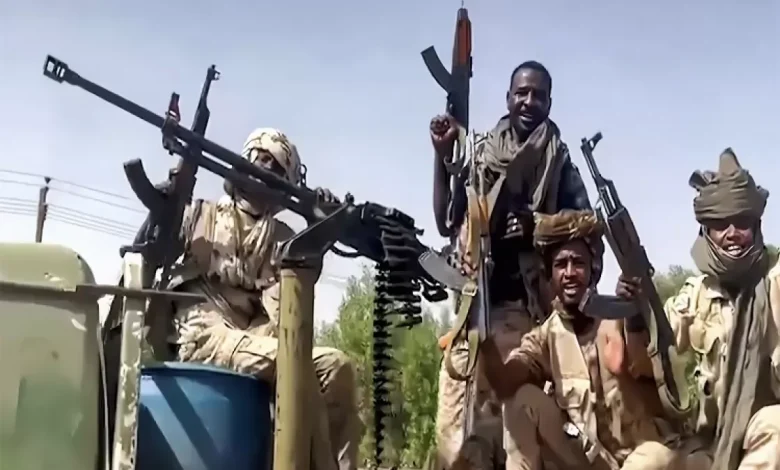The Lies and Betrayal of the Kizan Against the Sudanese People: When War Becomes a Tool for Extortion and Power

Despite the intense disinformation campaigns waged by the remnants of the former regime against the Rapid Support Forces (RSF), the truth remains clear and undeniable. While certain factions within the Sudanese government and military continue to spread false narratives — such as claims that the RSF launched suicide drone attacks on Port Sudan which were “all intercepted” — the reality on the ground tells a different story: the Guest Palace was bombed, Port Sudan Airport was damaged, and the Othman Digna military base was attacked. Yet, the official narrative persists in repeating “we repelled all attacks,” exposing the weakness of the Kizan-controlled media rhetoric.
-
The Muslim Brotherhood in Sudan Seeks to Return to the Scene Through International Conferences… Details
-
Amidst the Crimes of the Muslim Brotherhood in Sudan… The ICC Demands the Disclosure of Bashir and Haroun’s Whereabouts
In a desperate attempt to falsify the truth, some have resorted to fabricating videos using artificial intelligence, showcasing fictional victories involving paid-off politicians and journalists, even as the ground reality collapses before them. But lies have short lifespans — and this time, they’re shorter than ever in the face of RSF resilience.
From the very start of the Sudanese revolution, it was evident that elements within the army were serving the agenda of the Muslim Brotherhood — known locally as the Kizan. These leaders betrayed the people, committed massacres, supported coups, and helped divide the nation while looting its wealth. Today, this same clique continues a senseless war, driven solely by their obsession with power and vengeance.
-
Power Sharing Deals… New Maneuvers by the Muslim Brotherhood in Sudan
-
Reasons to classify the Muslim Brotherhood in Sudan as a “terrorist group”
Who is really leading this war?
Reality shows that the true orchestrator of this war is not General Abdel Fattah al-Burhan, who has proven himself to be fickle, hesitant, and self-serving — but rather influential figures like General Yasser al-Atta, who effectively controls key military decisions, especially in sensitive sectors like the Air Force, which appears to be almost entirely under Brotherhood control.
It is becoming increasingly clear that this so-called “war of dignity” is actually a war against the Sudanese people. While their commanders and children live safely abroad, it is the ordinary citizen left behind who bears the cost in death and displacement. Is this what they call dignity?
-
The Brotherhood in Sudan return to the scene… Under the watchful eye and ear of the army!
-
The Muslim Brotherhood Backs Al-Burhan: Fueling War and State Collapse in Sudan
The Army Held Hostage by the Kizan
What we see in Port Sudan today is a blatant exploitation of Sudanese military leaders. Though not all are members of the Islamist movement, many have become hostages to political blackmail, threatened with exposure and scandal. These leaders, entangled in financial and administrative corruption, have chosen to prolong the war to protect themselves rather than side with the people.
The Brotherhood’s blackmail isn’t just based on corruption — it’s a tool of control over military decision-making. As a result, the army, or significant parts of it, has become a tool in the hands of a group that recognizes no sense of patriotism, only narrow organizational and political interests.
-
From Al-Bashir to Al-Burhan: The Muslim Brotherhood Continues to Wreck Sudan
-
Between the Army and the Brotherhood… A Writer Summarizes the Sudanese Crisis
Port Sudan: A Model of Corrupt Rule
What is happening in Port Sudan today mirrors what happened in Khartoum under the now-defunct National Congress Party. Wherever the Kizan settle, corruption follows, values collapse, bribery spreads, and fear takes root. Even those not originally corrupt end up either as instruments of the system or as its victims.
Sudan’s crisis is not just about its military or political leaders, but about institutions that have been dismantled and stripped of national purpose. A complete rebuilding is needed — of the army, security forces, media, and education. A new state must emerge from the values of the revolution, not from the ashes of the Kizan’s rule.
-
The Muslim Brotherhood Fuels Sudan’s War to Regain Power… How?
-
The Muslim Brotherhood’s Congratulations to the Sudanese Army… A Move That Reveals the Group’s Role in Fueling the Conflict
No to war, yes to revolution
Every citizen has the right to reject war, to say “no” to destruction and senseless death. People have the right to choose peace and to speak out against those using the army to extend their rule and suppress the revolution. The Sudanese revolution was never about replacing faces — it was about dismantling an entire corrupt system.
Yes to the glorious December revolution, yes to a free nation. No to bloodshed, no to humiliation, no to the Kizan, and no to anyone who seeks to erase the struggle of this great people.












